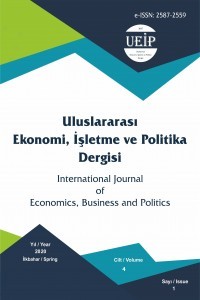TÜRKİYE’DE İKİZ AÇIK HİPOTEZİ: TODA-YAMAMOTO NEDENSELLİK YAKLAŞIMI / The Twin Deficit Hypothesis In Turkey: Toda-Yamamoto Causality Approach
İkiz Açıklar Hipotezi, Cari Açık, Bütçe Açığı, Toda-Yamamoto Nedensellik Yaklaşımı
THE TWIN DEFICIT HYPOTHESIS IN TURKEY: TODA-YAMAMOTO CAUSALITY APPROACH / Türkiye’de İkiz Açık Hipotezi: Toda-Yamamoto Nedensellik Yaklaşımı
Twin Deficits Hypothesis, Current Account Deficit, Budget Deficit, Toda-Yamamoto Causality Approach,
___
- Acaravcı, A. ve Öztürk, İ. (2008). Twin Deficits Phenomenon: Empirical Evidence From the ARDL Bound Test Approach for Turkey. Bulletin of Statistics & Economics, 2(A08), 57-64.
- Aksu, H. ve Başar, S. (2009). Türkiye İçin İkiz Açıklar Hipotezi'nin Tahmini: Bir Sınır Testi Yaklaşımı. Ankara Üniversitesi SBF Dergisi, 64(4), 1-14.
- Alkswani, M. A. (2000). The Twin Deficits Phenomenon in Petroleum Economy: Evidence From Saudi Arabia. 1-25. Erişim Adresi: http://www.mafhoum.com/press2/79E15.pdf.
- Anoruo, E. ve Ramchander, S. (1998). Current Account and Fiscal Deficits: Evidence From Five Developing Economies of Asia. Journal of Asian Economics, 9, 487-501.
- Bahmani-Oskooee, M. (1989). Effects of the U.S. Government Budget on Its Current Account: An Empirical Inquiry. Quarterly Review of Economics and Business, 29, 4, 76-91.
- Barro, R. J. (1974). Are Government Bonds Net Wealth?. Journal of Political Economy, 82, 1095-1117.
- Bilgili, F. ve Bilgili, E. (1998). The Effects of Budget Deficit On Current Account Balance: Theory and Empirical Evidence. Munich Personal RePEc Archive; Working Paper No: 80866.
- Chang, J-C. ve Hsu, Z-Z. (2009). Causality Relationships between the Twin Deficits in the Regional Economy. Erişim Adresi: https://www.researchgate.net/publication/260389192.
- Dibooğlu, S. (1997). Accounting for US Current Account Deficits: An Empirical Investigation. Applied Economics, 29, 787-793.
- Enders, W. ve Lee, B.S. (1990). Current account and budget deficits: twins or distant cousins?, The Review of Economics and Statistics, 72, 373–381.
- Ganchev, G. T. (2010). The Twin Deficit Hypothesis: The Case of Bulgaria. Financial Theory and Practice, 34(4), 357-377.
- Güriş, S. ve Yılgör, M. (2008). OECD Ülkelerinde Bütçe Açıkları ve Dış Ticaret Açıkları Arasındaki İlişki: Panel Veri İle Nedensellik Analizi. Marmara Üniversitesi İİBF Dergisi, 25(2), 773-783.
- Islam, M.F. (1998). Brazil’s Twin Deficits: An Empirical Examination. Atlantic Economic Journal, 26(2), 121-128.
- Kearney, C. ve Monadjemi, M. (1990). Fiscal Policy and Current Account Performance: International Evidence on The Twin Deficits. Journal of Macroeconomics, 12(2), 197-219.
- Khalid, M.A. ve Guan, T.W (1999). Causality Tests of Budget and Current Account Deficits: Cross-Country Comporisons. Emperical Economics, 24,389-402.
- Kör, E. (2012). İkiz Açıklar Hipotezi: Türkiye Örneği. (Yayımlanmış Yüksek Lisans Tezi). Ankara Üniversitesi Sosyal Bilimler Enstitüsü, Ankara.
- Mangır, F. (2012). Türkiye İçin İkiz Açıklar Hipotezi Testi (1980-2011). Niğde Üniversitesi İİBF Dergisi, 5(2), 136-149.
- Mukhtar, T., Zakaria, M. ve Ahmed, M. (2007). An Empirical İnvestigation For The Twin Deficits Hypothesis in Pakistan. Journal of Economic Cooperation, 28(4), 63-80.
- Normandin, M. (1999). Budget deficit persistence and the twin deficits hypothesis. Journal of International Economics, 49, 171–193.
- Pahlavani, M. ve Saleh, A.S. (2009). Budget Deficits and Current Account Deficits in The Philippines: A Causal Relationship?. American Journal of Applied Sciences, 6(8), 1515-1521.
- Salvatore, D. (2006). Twin deficits in the G-7 countries and global structural imbalances. Journal of Policy Modeling, 28, 701–712.
- Saysombath, P. ve Kyophilavong, P. (2013). Twin Deficits in the Lao PDR: An Empirical Study. International Business and Management, 7(1), 62-68.
- Şahin, D. (2015). İkiz Açık Hipotezinin Geçerliliği: Türkiye Örneği (1995-2013). Yönetim ve Ekonomi, 22(1), 49-59.
- Toda, H. Y. ve Yamamoto, T. (1995). Statistical İnference İn Vector Autoregressions With Possibly İntegrated Processes. Journal of Econometrics, 66, 225-250.
- Utku, U. (2003). Türkiye’de Bütçe Açıkları ve Dış Ticaret Açıkları Gerçekten İkiz mi? Koentegrasyon ve Nedensellik Bulguları. Dokuz Eylül Üniversitesi, İİBF Dergisi, 18, 1-47.
- Üzümcü, A. ve Kanca, O. C. (2013). İkiz Açık Hipotezi: Türkiye Üzerine Bir Uygulama (1980-2012). İnönü Üniversitesi Uluslararası Sosyal Bilimler Dergisi, 2(1), 17-42.
- Başlangıç: 2017
- Yayıncı: Ali Rıza SANDALCILAR
Aziza SYZDYKOVA, Cihan TANRIÖVEN
Bayram AYDIN, Mahmut Şaban AFSAL
DÜNYAYLA İŞ YAPANLAR KÜRESELLEŞME SÜRECİNDE TÜRK ÇOKULUSLULARI
